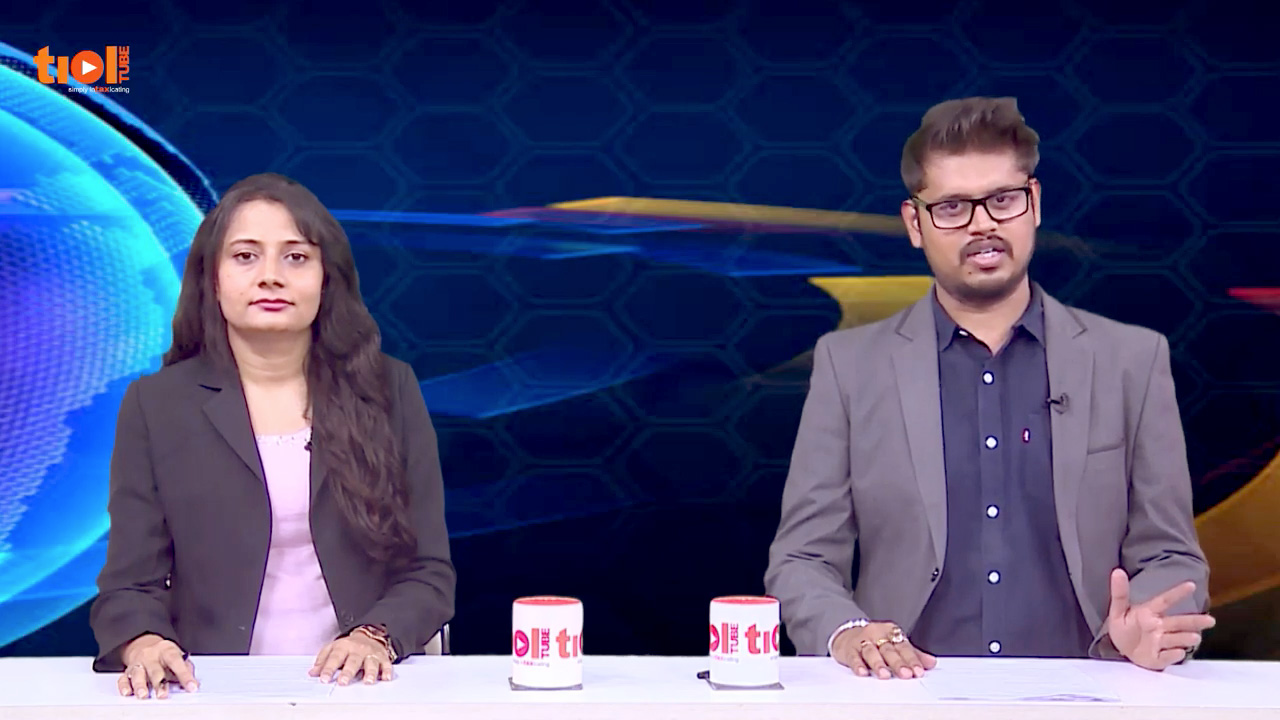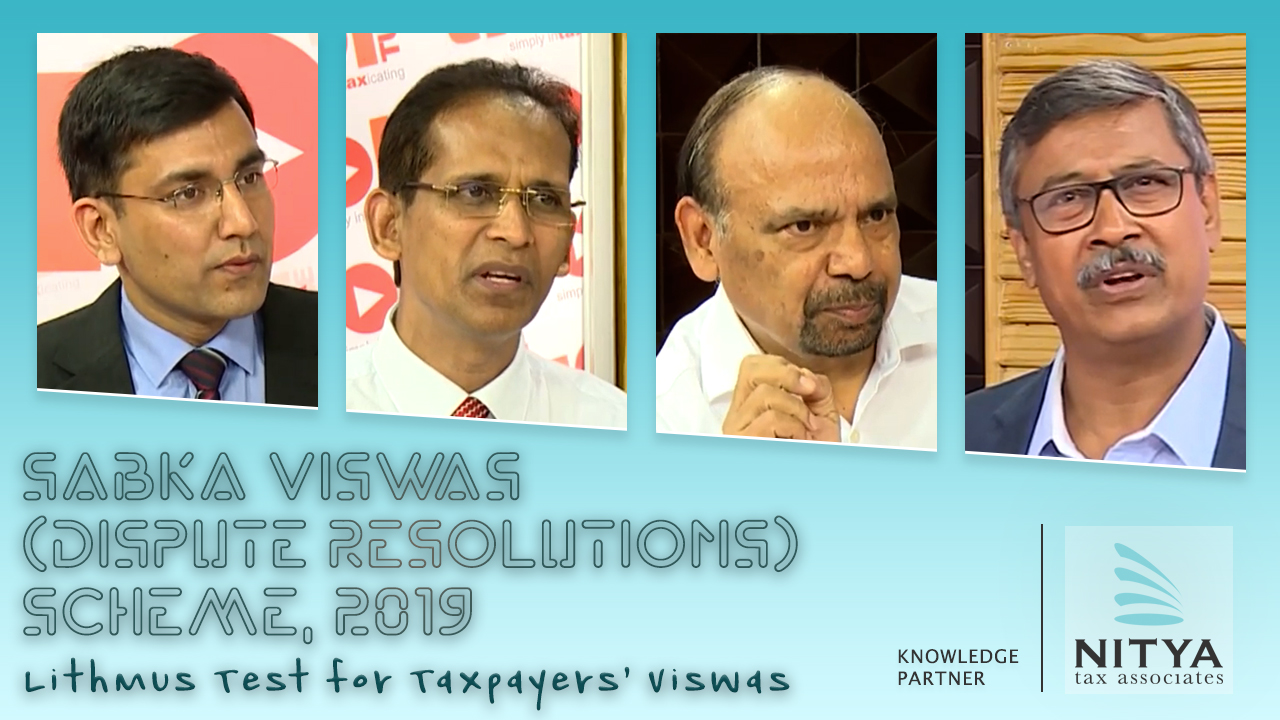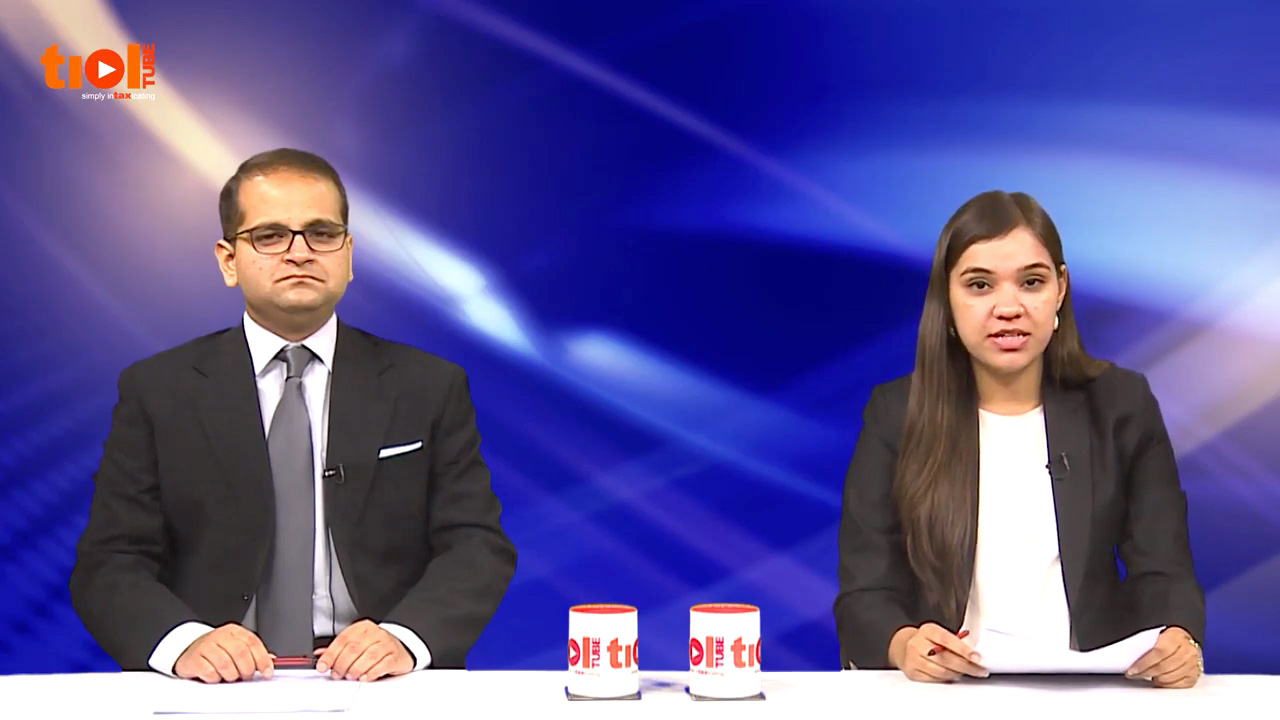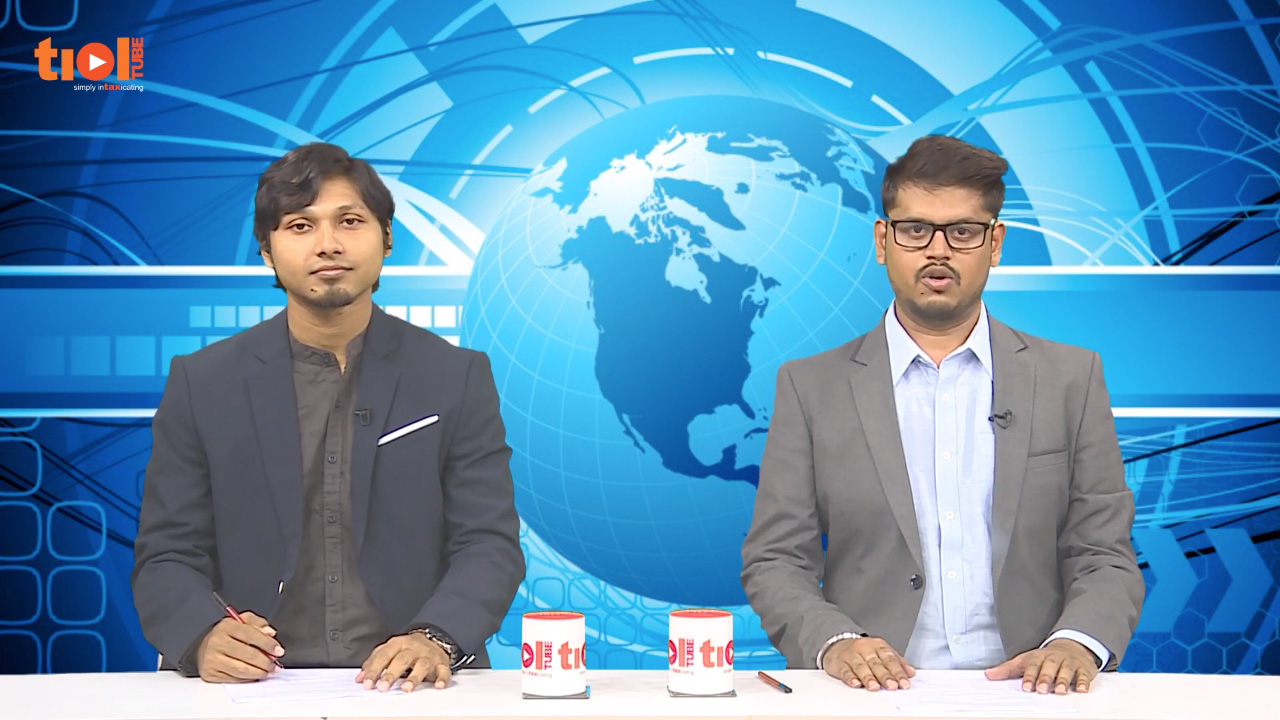|
SERVICE TAX
2019-TIOL-2105-HC-P&H-ST
CCE Vs BSNL
ST - Assessee is engaged in providing "Telephone Service" and availing cenvat credit on capital goods and input services used in providing output service - It is alleged that the assessee, though providing both taxable and non-taxable services, was not maintaining separate account of cenvat credit for taxable and exempted/non-taxable services and utilizing the same for payment of service tax as per Rule 6 of CCR, 2004 - It is also alleged that assessee was entitled to utilize cenvat credit upto 20% of service tax payable, whereas it was utilizing cenvat credit upto 100% of service tax payable - The assessee admits that in view of instructions dated 22.8.2019 , the instant appeal would not be maintainable before this Court, as demand amount i.e. 94,57,161/- is to be recovered, which is below the monetary limit of Rs. 1 Crore - Same is dismissed as withdrawn: HC
- Appeal dismissed : PUNJAB AND HARYANA HIGH COURT 2019-TIOL-2595-CESTAT-AHM
Polad Treders Pvt Ltd Vs CST
ST - The assessee is engaged in providing "clearing and forwarding agent service" and paying service tax on remuneration paid to them for 'CFA' service - From the agreement, it is seen that there are separate charges for service of 'CFA' and additional charges towards the various expenses which assessee has to undertake on behalf of their client, therefore, the remuneration for 'CFA' service is clearly identified, all other charges are paid as reimbursable charges by the service recipient - Therefore, these charges are over and above the remuneration in respect of 'CFA' service and it is not towards the service of 'CFA' as a reimbursement of expenses - Therefore, it cannot be said that the reimbursable expenses is part of the service charge of 'CFA' - This issue has been considered by Supreme Court in Intercontinental Consultants and Technocrats Private Limited 2018-TIOL-76-SC-ST - Following the said judgment, only remuneration towards 'CFA' service is leviable to service tax and the reimbursable expenses charged by assessee was not taxable - Since the details of all reimbursable charges on the agreement needs verification, matter is remitted back to the adjudicating authority - As regards to demand of service tax on BAS, the impugned order is only on the issue of reimbursable expenses and BAS i.e. incentive received from Tata Chemicals and courier service, since, there is a contradiction between the submission made by assessee and the finding given in the impugned order, these issues are also needs to be re-considered - Appeals are allowed by way of remand to the adjudicating authority: CESTAT
- Matter remanded: AHMEDABAD CESTAT
2019-TIOL-2594-CESTAT-MUM
NRB Industrial Bearings Pvt Ltd Vs CCE & ST
ST - Appellants are engaged in manufacture of ball/roller bearings – a SCN was issued alleging that they were availing services of their director namely Shri D.S.Sahney and were paying remuneration for the same and they are liable to pay ST on the remuneration paid to the director under reverse charge mechanism – SCN confirmed – on appeal, Commissioner (Appeals) confirmed the ST on the remuneration paid in excess of the salary reflected as per Form 16 – appeal to CESTAT.
Held: Only due to the fact that taxable income is shown in Form 16, it cannot be said that other perquisites are not part of remuneration to the employee and are paid for consultation etc. rendered by him - no case is made out by the department that such remuneration, other than salary paid to him, was not for the routine work he performs as Managing Director, but was for the consultation he provides - therefore, the instant case is squarely covered by the exclusion contained under section 65(44) (b) of Finance Act, 1994 – the Bench also finds strength from the case laws cited by the appellant [Rent Works India Pvt. Ltd. - 2016-TIOL-1199-CESTAT-MUM and also the case of Allied Blenders and Distilleries Pvt. Ltd. 2019-TIOL-25-CESTAT-MUM - in view of the above, the impugned order is not maintainable - in the result, the impugned order is set aside and appeal is allowed : CESTAT [para 4.1, 5]
- Appeal allowed: MUMBAI CESTAT
2019-TIOL-2593-CESTAT-MUM
CCE & ST Vs Satyam Home Makers
ST - Whether the Commissioner is justified in waiving the penalties under section 80 of the Finance Act, 1994 [Act] – appeal by Revenue.
Held: It is true that the issue of ST on builders was challenged before the Bombay High Court during the relevant period - it is also not disputed that as soon as the writ petition was rejected by the High Court, the respondent instantly took the ST registration and paid the ST with interest as per their calculation much before the issuance of SCN, although the same was short by few thousand rupees - but that itself shows that there is no mala fide intention to evade the ST on the part of the respondent - there is no suppression of fact because the issue involved is of interpretation of law as the confusion was prevailing amongst the builders about the constitutional validity of the levy of ST on Builders and Developers – therefore, benefit of doubt that existed in the mind of the assessee is to be given to the respondent - it constitutes a reasonable cause for not paying the ST in view of section 80 of the Act which was in operation during the period in dispute - therefore, the Commissioner was justified in interfering with the levy of penalty by setting aside the same - he did not interfere with the ST demand along with interest thereon and for the differential amount he held the respondent liable to pay the same with interest and penalty under section 78 of the Act - therefore, no infirmity seen in the order passed by the Commissioner - in view of the above, the appeal filed by the revenue is devoid of merits and the same is hereby dismissed : CESTAT [para 5, 6]
- Appeal of Revenue dismissed: MUMBAI CESTAT
CENTRAL EXCISE
2019-TIOL-2106-HC-MAD-CX
Govardhan Spinners Ltd Vs CCE
CX - The petitioner submitted that there are about 50 witnesses, who are required to be cross examined and though he has given a letter to the respondents seeking permission to cross examine these witnesses, the respondent had neither granted permission nor rejected the same, but had passed the impugned order - The respondent submitted that various opportunities to file their reply as well as the personal hearing was extended to the petitioners and inspite of the same, he has not availed these opportunities - Since the order was passed after 15 months from the SCN and the entire period of 15 months was only at the instance of the petitioners, it can only be said that the petitioners were given sufficient opportunity and therefore it will not amount to violation of the principles of natural justice - No reply statement has been filed opposing such a statement made in the counter affidavit - As such, it is seen that the petitioners were granted opportunity at least on four occasions which have not been availed by theM - The petitioner has not produced any list of witnesses whom they intend to cross examine - In these circumstances, it can be said that sufficient opportunities were extended to the petitioner, which was not availed by them, within a reasonable time - Since the petitioners have approached this Court within the appeal time prescribed to approach the CESTAT, this Court is of the view that the petitioners can be granted an opportunity to file an appeal within a stipulated time - Writ petition stands closed with liberty to the petitioner to file an appeal before the CESTAT, under Section 35(B) of CEA, 1944, within a period of three months: HC
- Writ petition closed : MADRAS HIGH COURT 2019-TIOL-2592-CESTAT-MAD
Sharda Motor Industries Ltd Vs CCGST
CX - Whether the appellant/assessee is eligible for cenvat credit of outdoor catering services after 1.4.2011.
Held: Issue has been decided in assessee's own case while disposing batch of cases vide Final Order dated 24.6.2019 [ 2019-TIOL-1980-CESTAT-MAD ] - following the same, the appellant is not eligible for the credit on outdoor catering services to the tune of Rs.18.39 lakhs - therefore, re-credit taken by the appellant is not correct and on this score, the demand raised is legal and proper - the issue of eligibility of credit on outdoor catering services being interpretational issue, the appellant cannot be saddled with intention to evade payment of duty and, therefore, the penalty imposed in this regard requires to be set aside and is set aside - since the issue is settled in favour of Revenue, the impugned order does not call for any interference - appeal is partly allowed by setting aside the penalty as above : CESTAT [para 5, 6]
- Appeal partly allowed: CHENNAI CESTAT
2019-TIOL-2591-CESTAT-AHM
Resham Petrotech Ltd Vs CCE & ST
CX - The assessee is manufacturing Sheathing Compound for Telecom companies who in turn are manufacturing Cables to be supplied to BSNL and MTNL - For supply of such Sheathing compound, the vendor should be approved by Compound Approval Centre for Telecommunications (CACT) - In case of demand pertaining from Aug. 02 to March 03, it is an undisputed fact that the assessee had reversed cenvat credit on 2506 MT of raw material cleared as such to M/s R.K. Enterprises - A quantity of 2506 MT of raw material was sold to M/s R.K. Enterprises out of the 3265 MT of polyethylene granules alleged to have not been received in the factory - Though the allegation is of diversion of granules, but no investigation has been made from the transporter, truck driver as to where the said goods were diverted - Even Shri Asopa who had written/maintained the records on the basis of which the allegation of non receipt/diversion of granules was made was not questioned about the recipient of such goods - Further, it is nowhere appearing in SCN as to how the consideration of such alleged diverted goods were received - The statement of Shri Asopa stands retracted by him during his cross examination and hence cannot be relied upon - Moreover, the records maintained by him are in isolation and hence not reliable - The SCN placed reliance upon the report of checkpost incharge - The assessee had sought cross examination of check post incharge to show that there are other alternate routes from GAIL, Pata to Silvassa through which the goods are also transported to Silvassa - However, the adjudicating authority denied the request of assessee without assigning any reason - In such case, when no cross examination of person whose report is being relied upon has been provided, it cannot be held that the assessee did not receive the said goods - Thus, merely on the basis of report of check-post authorities, it cannot be concluded that the goods were not transported to the assessee at Silvassa - Further, in case of demand for period Jan'04 to Oct'04, the goods were sold and cleared by M/s GAIL to assessee on FOR basis and the transporter was deputed by them - The adjudication has clearly overlooked this vital aspect - It was GAIL who would have decided the transporter to transport the consignments to assessee and they have no control over deciding any transport - When the prices were on FOR basis and the transporter was appointed by M/s GAIL, it cannot be said that the assessee could have diverted any goods by understanding with the transporter - Thus, in absence of evidence of diversion of material, the demand of cenvat credit is not sustainable - In earlier round of appeal, the Tribunal had directed to re-examine the statement which was not done by the adjudicating authority - The statement of Shri Rohit Kumar Asopa stands retracted by him and the director of assessee, Shri Pradeep Lohia, has refused diversion of goods, as alleged in SCN - Moreover, in absence of any investigation to identify the buyer of diverted material and receipt of consideration by assessee, merely on the basis of transporter's statements or the private records, it cannot be concluded that the assessee has diverted the goods - Thus, the demand does not sustain - The department could not establish the non receipt of inputs beyond doubt to uphold the impugned order - Thus, the impugned order is set aside: CESTAT
- Appeals allowed: AHMEDABAD CESTAT
2019-TIOL-2590-CESTAT-AHM
Gold Metal Extrusion Vs CCE & ST
CX - During visit to the factory of assessee, the officers seized two note book showing production of Billet and use of raw material, Gate Pass Book showing dispatch of finished goods without bills, kaccha chits showing receipt of raw material - A Pen drive maintained by one Shri Vimalkumar Dilipkumar Bharvada, clerk cum general Supervisor was seized which is said to be containing day wise production and party wise records - The assessee during the adjudication proceedings had contested the demands by asking cross examination of parties who had allegedly received the goods shown in gate passes but could not produce any record showing receipt of goods by them - The assessee had also contested the demands on the ground that the statements are not voluntary and that the data contained in pen drive cannot be relied upon as it contains the data of trading of scrap on high seas sales basis, clearance of job work goods under exemption and also not liable for duty and also castings used for captive consumption - When the demand is based upon statements of such buyers without any evidence of receipt of goods by them, in that case the adjudicating authority should have granted cross examination of such buyers including the partners as they had contested the allegation in reply as mandated under Section 9D of CEA, 1944 - Thus, the demand cannot be confirmed on the basis of statements when no opportunity of cross examination has been afforded to assessee - While demanding duty, the SCN has relied upon the data found in pen drive - The demand without investigation and corroborative evidence cannot be made by merely considering the figures mentioned in pen drive allegedly pertaining to clearances without payment of duty - It was necessary to go into the clearances of consignment to each of the buyer based upon investigation which was not done - Except the statements of some buyers, there is no other evidence of receipt of goods by the said buyers - The department has taken the quantity of casting from the pen drive, however, the clandestine removal of casting was neither alleged not established - The pen drive data contained the quantity of job work goods carried out by the assessee which is otherwise not liable to duty but department has not bothered to verify the same despite a categorical submission made by assessee before the lower authority - It is also fact that assessee could not have produced such huge quantity during the relevant period - Regarding penalty on partners, when demand itself is not sustainable, penalties are also not maintainable - Moreover, as of now, it is settled law in the judgments of Jurisdiction High Court in case of Pravin & Shah and Jaiprakash Motwani 2009-TIOL-121-HC-AHM-CUS that in case of partnership concern, a separate penalty on partners cannot be imposed - Thus, the demand and penalties imposed by impugned order against the assessee is not sustainable: CESTAT
- Appeals allowed: AHMEDABAD CESTAT
CUSTOMS
2019-TIOL-2589-CESTAT-DEL
Adept Logistics Vs CC
Cus - The assessee is the holder of Customs Broker License - On examination, department observed that Bill of lading dated 31.08.2017 was actually of 06.09.2017 - The licence of assessee was suspended which was later confirmed vide O-I-O - It is thereafter that a SCN was served upon assessee alleging the failure of custom broker to comply with Regulations 11(d), 11(g) and 79 of CBLR, 2013 - The incidence report was received by Commissioner on 27/10/2017 - The SCN bears 17/01/2018 as the date - As per the department, SCN of 17/01/2018 was dispatched on 17/01/2018 itself whereas as per assessee, it was put to Speed Post on 01/04/2018 that is after the expiry of period of 90 days - Irrespective the Speed Post receipt has a date of 01/02/2018, the impugned notice shall be deemed to have been issued by Commissioner if after signing the same, he has put it in the process of dispatch in such a way that it was out of its control on such date which falls within the stipulated period of limitation, such SCN cannot be held to be barred by limitation - With respect to the merits of the case, the adjudicating authority below has relied upon the statement of proprietor of assessee itself which is duly corroborated by an employee of assessee - There is no retraction to the said statements - The alleged forgery i.e. the change in date of Bill of lading also stands confirmed from EDI system and also from shipping line OOCL - Otherwise also the notification for making BIS certificate mandatory is of 01/09/2017 - The alleged forgery is the change in date from 06/09/2017 to 31/08/2017 which again corroborates the statement of Yogesh Kumar Pandey, proprietor of assessee as has been relied upon by the authority - No infirmity found in the impugned order: CESTAT
- Appeal dismissed: DELHI CESTAT
2019-TIOL-2588-CESTAT-MUM
Venture Resort Holdings Vs CC & CE
Cus - The assessee was proceeded against for export of 'iron ore' at Panaji, a minor port, without discharging the appropriate duty liability against shipping bill in which loading commenced on 1st March 2007 - The demand arose from the imposition of export duty on 'iron ore' at Rs. 300/MT effective from midnight of 28th February 2007/1st March 2007; till then such exports were subject only to cess of Rs. 1/MT and the new levy came into force while the vessel was yet in port of loading - There are two aspects that appear to have been overlooked - It is seen that the application for 'entry inwards' was filed by exporter, unusually, instead of having been made on behalf of 'master of the vessel' by the steamer agent - While 'entry inwards' is a pre-requisite for unloading of imported goods as per section 31 of Customs Act, 1962, 'entry outwards' is a pre-requisite for loading of export cargo as per section 39 of Customs Act, 1962 - The spacing of the two ensures that there is no mix-up of either and that both inward and outward cargo are separately accounted for - It is normal for the 'entry outwards' to be granted only after space is available for loading export cargo; for bulk carriers, effectively it is given only after the vessel is empty - It is, therefore, a permission that is consequent to 'entry inwards' - The adjudicating authority has failed to render a finding on validity of 'entry inwards' in the circumstances and no record found for ascertainment of date of entry outwards - Even though these would not, in any way, detract from the sanctity of validly granted 'let export order', the validity itself could be called into question on findings of facts and circumstances - No conclusions have been drawn from the circumstances in which the demand draft for payment of cess was not deposited on 28th February 2007 despite which 'let export order' was granted - Matter is remanded back to the original authority to ascertain those facts before coming to a conclusion on the veracity of the claim of the assessee that the 'let export order' of 28th February 2007 is valid in law: CESTAT
- Appeals disposed of: MUMBAI CESTAT |
|









